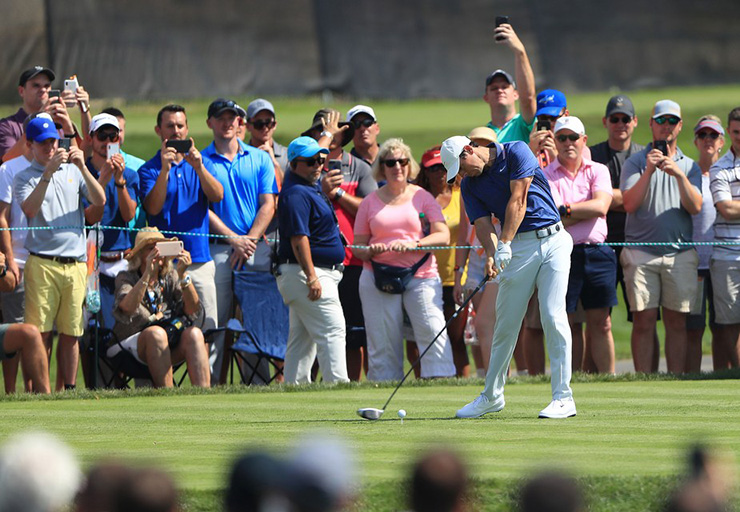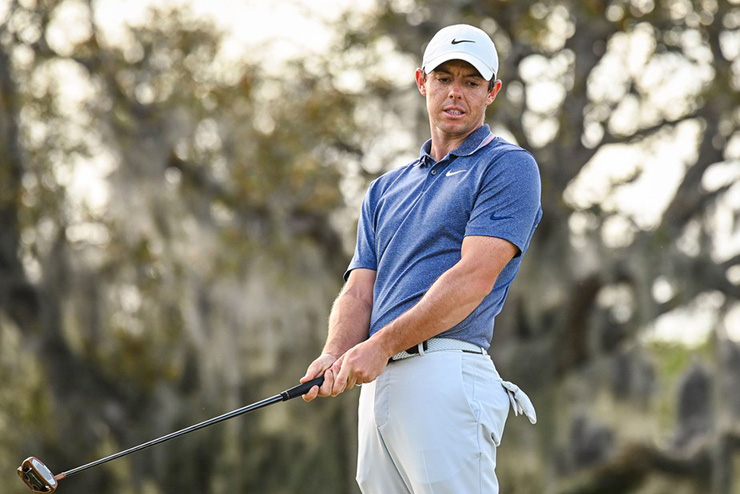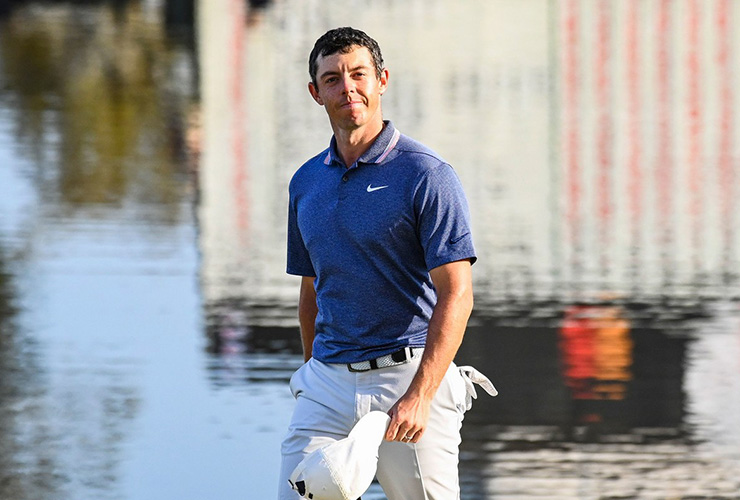By John Feinstein
On July 22, 2001, David Duval put on a bravura performance in the final round of the Open Championship at Royal Lytham and St. Anne’s, shooting 67 to pull away from the field and win his first major title by three strokes. He had been agonizingly close before to winning a major but had never quite reached the finish line. The weekend at Lytham changed all that. It was the 13th victory of Duval’s professional career and, at 29, the door was apparently now open for him to win a multitude of tournaments and add to his newly started collection of majors.
He never won again.
Nine years later, I had a long conversation with Duval about what happened after Lytham. He suffered a number of injuries in the ensuing years but that, he said, wasn’t the reason he stopped winning.
“Honestly, it was existential,” Duval explained. “I spent my entire life, hours and hours practising, sweating, grinding, thinking the Holy Grail was winning a major championship. And then, finally, I won one. Don’t get me wrong, it was a great feeling, and I’m proud to this day to be able to call myself an Open champion. But I realized soon after that in the grand scheme of things, I didn’t feel any different. I wasn’t happier, I didn’t feel like I was a better person in any way. Something went out of me. It was an ‘Is that all there is?’ kind of feeling. I was still playing great golf when I got to the PGA that year, good enough, I think, to win the golf tournament. But the drive just wasn’t there. I wanted it to be there. I searched for it, but it wasn’t there.”
Duval finished tied for 10th in that PGA in Atlanta Athletic Club. Since then, he has entered 37 majors and made eight cuts. He had one spasm where he became the player he had once been, at the 2009 U.S. Open at Bethpage, where he finished tied for second. Now, at 47, he’s content in a TV booth, coming out a couple of times a year to enter a tournament.
To compare Rory McIlroy’s current predicament to Duval’s is ludicrous. At 29, the same age Duval was when he won for the last time, McIlroy is in contention these days almost every time he tees it up. In fact, in six PGA Tour starts this year, he has finished in the top six EVERY time.
There’s nothing existential about McIlroy’s game right now. His problem is much simpler than that: He can’t finish on Sundays, especially when he’s in the last group.
It happened again this past weekend at Bay Hill when he shot an even-par 72 to go from second place at the Arnold Palmer Invitational on Sunday morning to a tie for sixth by Sunday evening. He didn’t play horribly, just not well enough, especially when stacked up against Francesco Molinari’s remarkable eight-under-par 64 that allowed him to race past the leaders and grab what turned out to be a two-shot win over third-round leader Matthew Fitzpatrick. McIlroy finished in the group four shots behind Molinari.

McIlroy’s power game didn’t help on Sunday at Bay Hill, where an even-par 72 dropped him to T-6. (Sam Greenwood/Getty Images)
The 64 was the same score McIlroy shot a year ago on the same golf course to win for the 14th time on the PGA Tour—four of those victories coming in majors. Like Molinari this time, McIlroy came from behind that Sunday, charging past the leaders with a back-nine 31 that included birdies on five of the last six holes. Hall-of-Fame stuff.
But McIlroy wasn’t in the last group that day. Since the start of 2018, he has been in the last group for the final round nine times. That means he’s played a lot of good golf. And yet, he doesn’t have a tournament title to show for it.
No one—with the exception of a young Tiger Woods—always wins with the 54-hole lead. But it’s pretty clear right now that teeing off last on Sunday (or on Monday as was the case last fall in Philadelphia when weather delayed the final round of the BMW Championship) has gotten in McIlroy’s head.
So what does any of this have to do with Duval? Simple: They are two of the brightest and most thoughtful people to ever play golf. They don’t look at the world through the prism of wins and losses.
I am not falling back on the cliché that you can be too smart as an athlete. Woods and Jack Nicklaus are both plenty bright and have done fine. If McIlroy retired tomorrow, he’d be a first-ballot Hall-of-Famer.
There is, however, something to be said for not over-thinking. I think I know McIlroy well enough to believe that this issue dates to last year’s Masters. For the record, he will tell you a million times over that this is completely untrue. But I know how much he wants to win at Augusta to wrap up the career Grand Slam.
Last year, McIlroy started on Sunday at Augusta in the final group, paired with Patrick Reed, who had a three-shot lead. McIlroy had shot 65 in the third round to get into the final group. Reed, leading a major on Sunday for the first time, bogeyed the first hole and had to settle for par at the par-5 second. McIlroy made a nice up-and-down for par at the first and had a five-foot eagle putt at No. 2. A make would have tied him for the lead and given him all sorts of momentum. But he missed and then bogeyed No. 3 while Reed righted himself with a birdie.
By day’s end, Reed had hung on to win—against charges from Rickie Fowler and Jordan Spieth. McIlroy shot 74—four shots higher than anyone else in the top 16—and finished T-5. Since then, Sundays in the final group have been like nails-on-a-chalkboard for those who root for McIlroy.

McIlroy can take solace in having recorded six top-10 finishes in six starts this season. (Keyur Khamar/PGA Tour)
I talked to McIlroy a couple of weeks after last year’s Masters. It was on his first wedding anniversary. He and wife Erica had been delayed that day returning to Florida from Ireland because the Palm Beach Airport had been closed since Air Force One was there. He was on his way to buy Erica an anniversary present when we talked.
“You know, for me to say I wasn’t disappointed by what happened on Masters Sunday would be foolish,” he said. “But it’s a lot more important to me that I be a good husband the next 20 years than win the Masters. I want to win the Masters and I want to win a lot more golf tournaments. But I understand there’s more to life than winning golf tournaments. A lot more.”
Coming out of the mouth of many athletes, I’d write that off as rationalizing defeat. But not McIlroy. You don’t win as much as he’s won without two things: massive talent and an equally massive will to win. That’s why he’s thrown the occasional tantrum and done a couple of post-round stalk-offs after playing poorly.
But he’s also very dedicated to being a good husband, a good son and, I’d guess someday in the not-too-distant future, a good father. There’s nothing existential in that, but it’s quite human.
I believe McIlroy will win from the final group on Sunday soon. It might very well happen at Augusta because sometimes that’s what truly great athletes do: They break out of slumps in the most spectacular way possible.
McIlroy will beat the Sunday blues—just as soon as he stops thinking about them. Perhaps he needs to take a page from Han Solo’s playbook: “Never tell me the odds.” Just drive through the asteroid field and don’t give it a second thought. Or, for that matter, a first one.









